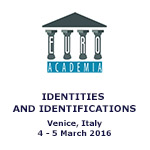Euroacademia Conferences
 Europe Inside-Out: Europe and Europeanness Exposed to Plural Observers (9th Edition) April 24 - 25, 2020
Europe Inside-Out: Europe and Europeanness Exposed to Plural Observers (9th Edition) April 24 - 25, 2020 Identities and Identifications: Politicized Uses of Collective Identities (9th Edition) June 12 - 13, 2020
Identities and Identifications: Politicized Uses of Collective Identities (9th Edition) June 12 - 13, 2020 8th Forum of Critical Studies: Asking Big Questions Again January 24 - 25, 2020
8th Forum of Critical Studies: Asking Big Questions Again January 24 - 25, 2020 Re-Inventing Eastern Europe (7th Edition) December 13 - 14, 2019
Re-Inventing Eastern Europe (7th Edition) December 13 - 14, 2019 The European Union and the Politicization of Europe (8th Edition) October 25 - 26, 2019
The European Union and the Politicization of Europe (8th Edition) October 25 - 26, 2019 Identities and Identifications: Politicized Uses of Collective Identities (8th Edition) June 28 - 29, 2019
Identities and Identifications: Politicized Uses of Collective Identities (8th Edition) June 28 - 29, 2019 The European Union and the Politicization of Europe (7th Edition) January 25 - 26, 2019
The European Union and the Politicization of Europe (7th Edition) January 25 - 26, 2019 7th Forum of Critical Studies: Asking Big Questions Again November 23 - 24, 2018
7th Forum of Critical Studies: Asking Big Questions Again November 23 - 24, 2018 Europe Inside-Out: Europe and Europeanness Exposed to Plural Observers (8th Edition) September 28 - 30, 2018
Europe Inside-Out: Europe and Europeanness Exposed to Plural Observers (8th Edition) September 28 - 30, 2018 Identities and Identifications: Politicized Uses of Collective Identities (7th Edition) June 14 - 15, 2018
Identities and Identifications: Politicized Uses of Collective Identities (7th Edition) June 14 - 15, 2018
The Construction of Gender in Gender-Sensitive Work of International NGOs in Ghana
-
-

-
Presentation speakers
- Fanny Froehlich, Development Planning Unit, University College London, UK
- Download presentation
Abstract:
My paper focuses on gender in the context of international NGO interventions in Sub-Saharan Africa specifically Ghana. In my current PhD research, I aim to address a number of questions of which some shall be discussed in this paper such as what impact did the “gender sensitive work” of certain NGOs have in the construction of presumed changed ideas of women’s roles and responsibilities? What understanding of ‘women’ do specific (international or European) NGOs conducting development interventions in Ghana display? My underlying assumption is that this understanding of women is often rooted in a European-enlightened context and disregards/neglects or at least treats as subsidiary more traditional views of women (within local communities they are working with). What, then, is the impact – both positive and negative – when international NGOs advocate for behaviour change within local communities that is implicitly centred in European-enlightened gender norms, which are times disconnected, at times overlapping with indigenous gender norms? In my paper, I will investigate and discuss whether and how elements from ‘traditional’ and ‘modern’ societal domains were linked, reformulated and reworked in a post-colonial setting to create certain perceptions and understandings of gender. My research focuses on the tensions between subjective / discursive / performative construction of identity and objective / empirical / universal components of social justice around gender. It aims at identifying ways of normatively evaluating gender images while critically unpacking values that are promoted in specific contexts – often, apparently objective / universal values really serve particular interest (as the study of modernity / post-colonialism tells us). My research aims at informing meaningful development work; such work has to go back to actually listen and try to understand the people in local communities NGOs are working with.
-
Related Presentations

Transcending Borders: Sheila Mysorekar’s Reflections on Transnational Identities
- Jennifer E. Michaels

Constructing Hindu Identity in Textbook Narratives: The Concept of Decontextualization
- Lars Tore Flåten

Performing Identity or the Performativity of Situatedness
- Monika Jaeckel

Borders Objects: Dissolution or Exacerbation of Identity
- Sabine Du Crest













